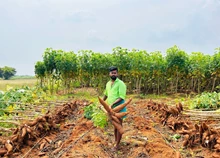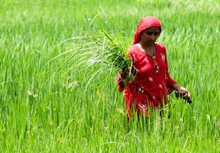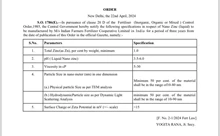
The Secretary General of CNRI, Binod Anand, stated at a UN conference that it is crucial to advance clean energy technologies and energy efficiency solutions during a Town Hall Meeting with the President of the General Assembly, Csaba Korosi, and Civil Society in this location.
According to Anand, energy efficiency and net zero energy systems will help ensure that everyone has access to affordable, sustainable, and clean future. He stated at the UN Conference that "we need a framework that prevents harmful chemicals from entering the environment and moves countries and businesses towards effective, safe, and green alternatives." In an era of collaborative governance, cooperation, according to him, is essential to resolving critical global issues.
"The solutions to the Global Challenges are both transnational in scope and cross-institutional. Any government or institution acting alone cannot deal with them. He said that governments, international organizations, businesses, academic institutions, NGOs, and imaginative people must work together to address them. Anand was chosen to deliver a statement on "Solutions through science" on behalf of the United Nations Department of Global Communications. Anand also used the leading cooperative organization in India, IFFCO, as an example, noting how it used nanotechnology to create a revolution with its NANO-UREA product.
In addition to sparing farmers' labour, it stops NO2 and ammonia emissions. He told the audience that it could contribute to achieving the Paris Climate Agreement's goals of limiting global warming and the UN Sustainable Development Goals. Anand also spoke extensively about ancient India's spiritual and scientific prowess while recalling the contribution of Indian seers to science.
"The best scientific solution suggested through the treatise Bhagavad Gita has been the universal science of the soul," said Anand, referring to India as the 'Land of Innovations, Discoveries, Spirituality, and Wonders.' All challenges are addressed through reconstruction, and happiness is the end of all our actions," Anand said.
"The scientific evidence that forces us to accept divinity and divine attributes. The content of this body of knowledge is timeless and eternal, unlike all other bodies of knowledge, which are subject to change. Yogis have taught us how to achieve a profound state of meditation, a sense of eternity, and happiness through "Chittashuddhi" (Eternal Purity).
The world has been able to measure the speed of light, the distance between the sun and earth, the origin of the moon's light, gravity and gravitation, centripetal forces, and telegraphy thanks to ancient Indian wisdom and scientific advancements, he continued. He continued, "We have learned to go beyond all limitations through Budhyan theories of mathematics to Aryabhatt, Brahmagupta's theory of finding Zero, and planetary positions.
The world has benefited from the Ancient Rishis' contributions to mathematics in the form of Zero, Algebra, Trigonometry, the Decimal System, Quadratic Formula, Fibonacci Numbers, Length, Weights, Geometry, Infinite Series, BinaryCode, and Chakravala, among other things. He continued, "The Algorithm and Encoding Method."
"With the help of the four Vedas, the eighteen Puranas, Tantras, and other writings from our ancestors, we have investigated the scientific solutions to all the problems the world is currently facing. Chanakya, one of our ancestors, wrote extensively on topics that are now studied and applied in foreign policy and economic diplomacy. Anand said that we have learned how to coexist with nature through Acharya Sushruta and Maharshi Kanad's Atomic Theory. Anand was chosen to speak on "Solutions through science" on behalf of the United Nations Department of Global Communications.
The Confederation of NGOs of Rural India, also known as CNRI, is the largest NGO platform in India and the rest of the world. It was founded in 2005. It currently has over 7000 NGOs as members and runs 634 District chapters and 29 State chapters across the nation. To revive and revitalize Indian agriculture and double farmers' incomes, CNRI has been working continuously for rural development and implementing MNREGA and other flagship programmes of the Government of India at various levels.











